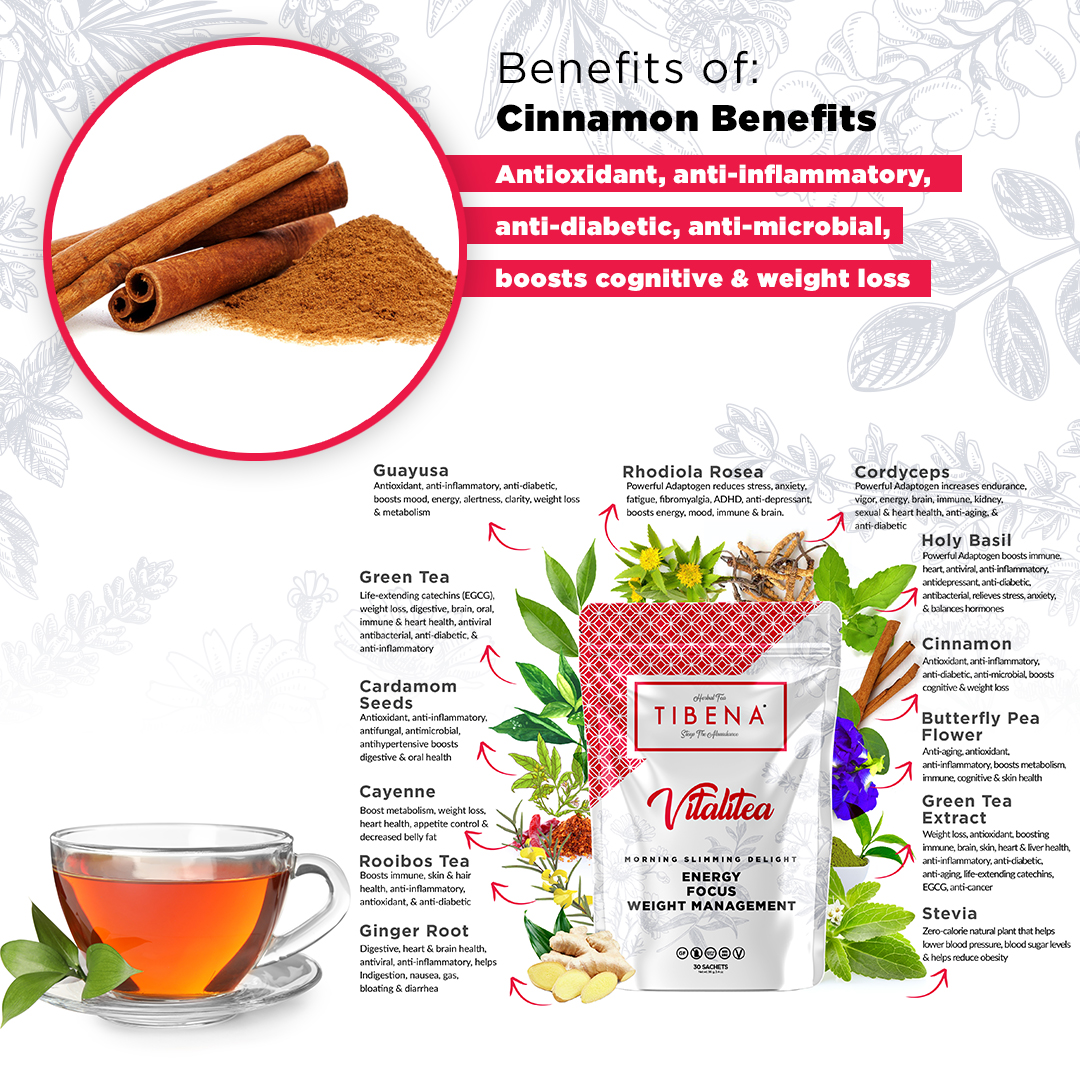
Studies have shown Potential Benefits:
Antioxidant, anti-inflammatory, anti-diabetic, anti-microbial, boosts cognitive & weight loss.
Cinnamon
What is it?
Cinnamon is an ancient spice that comes from the inner bark of the genus Cinnamomum evergreen tree. Cinnamon is prized and regarded highly for thousands of years for its health benefits. Delicious and known worldwide.
Antioxidant, anti-inflammatory, anti-diabetic, anti-microbial, boosts brain health & weight loss

https://www.ncbi.nlm.nih.gov/pmc/articles/PMC4609100/ – A review of clinical trials of the benefits of cinnamon helping to reduce blood sugar levels. Animal studies have shown cinnamon may reduce blood sugar levels. 60 people with Type II diabetes consumed cinnamon between 40 days and up to 4 months. The results: lower serum glucose, triglycerides, low-density lipoprotein cholesterol & total cholesterol.
https://www.ncbi.nlm.nih.gov/pmc/articles/PMC3030596/ – Cinnamon helps correct cognitive impairment in Alzheimer’s disease in animal models.
https://www.hindawi.com/journals/ecam/2014/642942/ – Various compounds in cinnamon may benefit the cardiovascular system. Cinnemaldehyde, for example, lowered blood pressure.
https://www.ncbi.nlm.nih.gov/pmc/articles/PMC4312399/ – Laboratory animals that received long-term treatment involving cinnamon and aerobic training had better heart function than those that did not.
https://www.hindawi.com/journals/ecam/2014/642942/ – Cinnamaldehydes may have antitumor and anticancer properties. Scientists treated mice with cancer using an extract of cinnamon and cardamom. Tests found lower levels of oxidative stress in the melanoma cells of the mice that received the treatment.
https://books.google.com/books?id=-x2yLLZG_r0C&pg=PT660&lpg=PT660&dq=Thomas+Valley+University+in+UK+reducing+fasting+blood+sugar&source=bl&ots=fawWXTenaO&sig=ACfU3U3JglJXTw2tILGFKF2bD2LBuFrfiw&hl=en&sa=X&ved=2ahUKEwiz6K_o3OTpAhVaZM0KHXKBAGUQ6AEwAHoECAkQAQ#v=onepage&q=Thomas%20Valley%20University%20in%20UK%20reducing%20fasting%20blood%20sugar&f=false– Randomized placebo controlled double blind study with 25 males & 33 females. Researchers concluded cinnamon be considered as an additional daily supplement to regulate blood glucose & blood pressure levels along with conventional medicines to treat type 2 diabetes.
https://bmccancer.biomedcentral.com/articles/10.1186/1471-2407-10-392 – Cinnamon induces tumor cell death.
The journal BMC Cancer showed that cinnamon extract was able to induce tumor cell death in skin cancer cells.
https://www.ncbi.nlm.nih.gov/pmc/articles/PMC4003790/ – In- depth review of cinnamon, potent anti-oxidant, anti-inflammatory, brain health, anti-diabetic, anti-microbial, anti-cancer, hearth health
https://www.ncbi.nlm.nih.gov/pmc/articles/PMC5469078/ – May help promote weight loss: A randomized double-blind placebo controlled clinical study of the daily consumption of cinnamon on individuals with metabolic syndrome for a 16 week period. Resulted in significant decreases in waist circumference and body mass index compared to a control group.
https://www.nature.com/articles/s41598-017-02263-5 – cinnamon extract induced browning of the fat cells, which is a process that is thought to increase metabolism and protect against obesity.
https://pubmed.ncbi.nlm.nih.gov/25629927/ – Anti-inflammatory – Cinnamon is an anti-inflammatory spice blocking inflammatory molecules like arachidonic acid, keeping inflammation in check and inflammation-related diseases at bay.
https://pubmed.ncbi.nlm.nih.gov/26109781/ – Anti-microbial – Cinnamon kills bacteria, viruses & some drug-resistant fungi.
https://pubmed.ncbi.nlm.nih.gov/24019277/ – Anti-diabetes – Studies on type II diabetics have shown that even less than 1/2 a teaspoon of cinnamon a day for 4 months can lower blood glucose levels by improving the function of insulin, a hormone that coaxes our cells to soak up blood sugar and use it for energy.
https://pubmed.ncbi.nlm.nih.gov/24559058/ – Cognition Boosting – Animal studies have shown that cinnamon improves memory and learning and reduces oxidative stress in the brain.
https://pubmed.ncbi.nlm.nih.gov/24946862/ – Cognition Boosting – Cinnamon may protect neurons in Parkinson’s disease
https://www.research.va.gov/currents/0716-6.cfm – A study with humans showed the scent of cinnamon improved cognitive function. “besides general memory improvement, cinnamon may target Alzheimer’s disease, mild cognitive impairment [a precursor to Alzheimer’s], and Parkinson’s disease as well.”
https://pubmed.ncbi.nlm.nih.gov/24813595/ Cinnamon improved menstrual regularity in women with polycystic ovarian syndrome (PCOS). the findings are intriguing given the link between insulin resistance and PCOS and cinnamon’s positive effects on insulin function.
https://www.ncbi.nlm.nih.gov/pmc/articles/PMC3429799/ – Improved glycemic status indicators (anti-diabetic)
https://pubmed.ncbi.nlm.nih.gov/16131142/ – Anti-inflammatory
https://pubmed.ncbi.nlm.nih.gov/14633804/ – Anti-diabetic
https://pubmed.ncbi.nlm.nih.gov/15607195/ – Anti-fungal
https://pubmed.ncbi.nlm.nih.gov/8834832/ – Anti-fungal
https://pubmed.ncbi.nlm.nih.gov/14633804/ – Study reveals that daily cinnamon reduces serum glucose, triglyceride, LDL cholesterol, and total cholesterol in people with type 2 diabetes. Including cinnamon in the diet of people with type 2 diabetes will reduce risk factors associated with diabetes and cardiovascular diseases.
https://scialert.net/fulltext/?doi=ijp.2007.482.486 – Antioxidant
